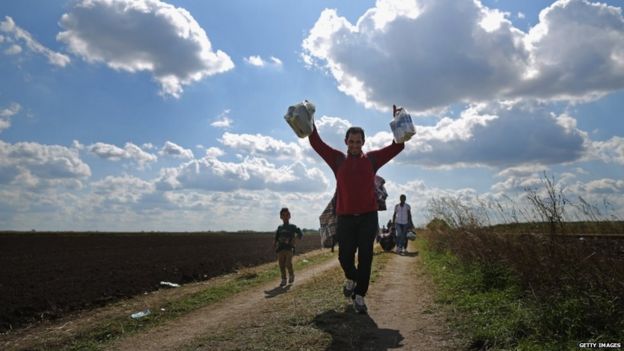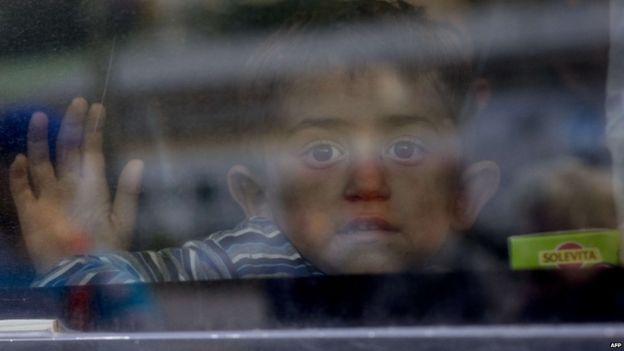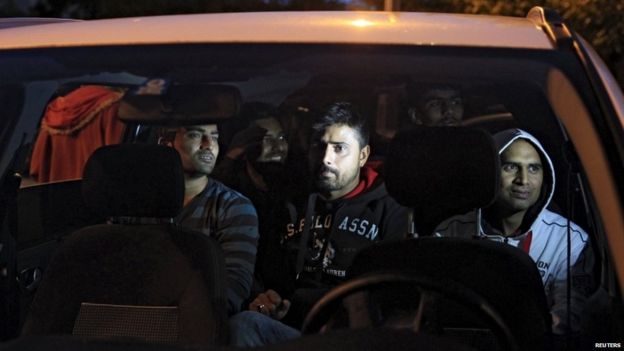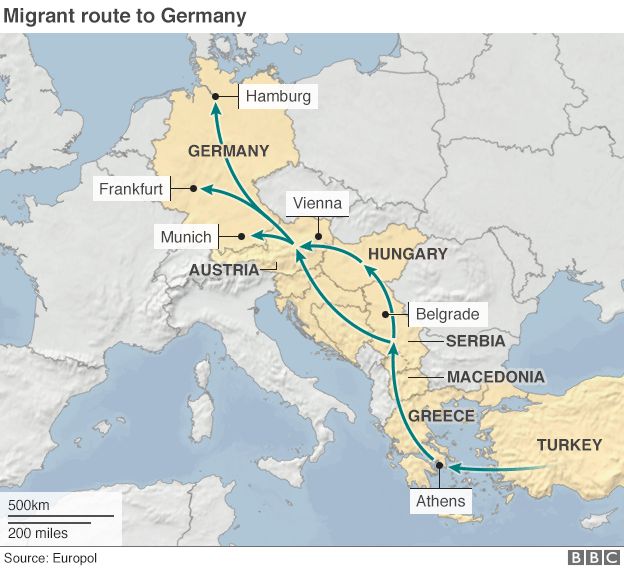Germany’s coalition government has agreed to spend 6bn euros (£4.4m) to support record numbers of migrants and other measures to deal with the influx.
Critics at home have accused Chancellor Angela Merkel of creating a dangerous precedent by opening Germany’s borders.
About 18,000 migrants arrived over the weekend after an agreement with Austria and Hungary to relax asylum rules.
But Austria’s Chancellor Werner Faymann has said the emergency measures must come to an end.
He said they would move step by step “towards normality”, after speaking to Chancellor Merkel and the Hungarian Prime Minister Viktor Orban on Sunday.
Hungary had previously blocked migrants travelling to Western Europe, but dropped restrictions on Friday and shuttled people to the Austrian border.
At Hungary’s border with Serbia construction work continues on the border fence, as people continue to stream across the border, unchallenged by police, the BBC’s James Shaw reports.
Meanwhile migrants are continuing to arrive at Munich station.

Thousands took advantage of an easing of restrictions to travel towards Western Europe

An estimated 18,000 migrants reached Germany over the weekend

Some were driven by a volunteer convoy
Germany’s announcement of extra funds came after talks on Sunday night between the two parties which make up Chancellor Merkel’s coalition.
The government has agreed to give €3bn ($3.3bn; £2.2bn) to the federal states and local councils, with a further €3bn to fund federal programmes such as benefit payments.
Specific measures announced include:
- A building programme to increase the number of places in reception centres for asylum seekers, suitable for winter months, to 150,000
- An extra 3,000 federal police officers
- Replacing cash allowances paid to asylum seekers in reception centres with benefits in kind
- More money for integration and language courses
- Kosovo, Albania and Montenegro will be added to the list of “safe” countries, meaning asylum seekers from those nations can deported more rapidly
The agreement stressed the need for “solidarity” and “a fair distribution” of refugees between EU states.
Germany expects to receive 800,000 refugees and migrants this year, and wants to see the rest of Europe do more to help.
But while Mrs Merkel has become a hero to many migrants and their supporters, conservative allies said she sent a “totally wrong signal” by allowing in the intake from Hungary.
The interior ministry said the decision was an exception to help avert a humanitarian crisis.
New arrivals in Germany were welcomed by smiling and cheering members of the public at train stations across the country.
On Sunday, a group of cars driven by German and Austrian activists travelled to the Hungarian border to pick up migrants and distribute food.
The migrants had travelled north through the Balkans – Greece, Macedonia and Serbia – before arriving at Hungary’s southern border, and on to Austria and Germany.
Syrians are the largest group travelling, followed by Afghans and Eritreans.
A rift has developed within the EU over how to deal with the crisis.

Hungary has accused Germany of encouraging the influx, and is pressing ahead with plans to tighten border controls and could send troops to its southern frontier if parliament agrees.
It has opened a new reception camp for migrants in southern border village of Roszke, and is due to finish its border fence this month.
The UN’s Refugee Chief Antonio Guterres said the crisis was “manageable” if member states could agree a joint plan.
BBC
 Q FM Africa's Modern Radio
Q FM Africa's Modern Radio